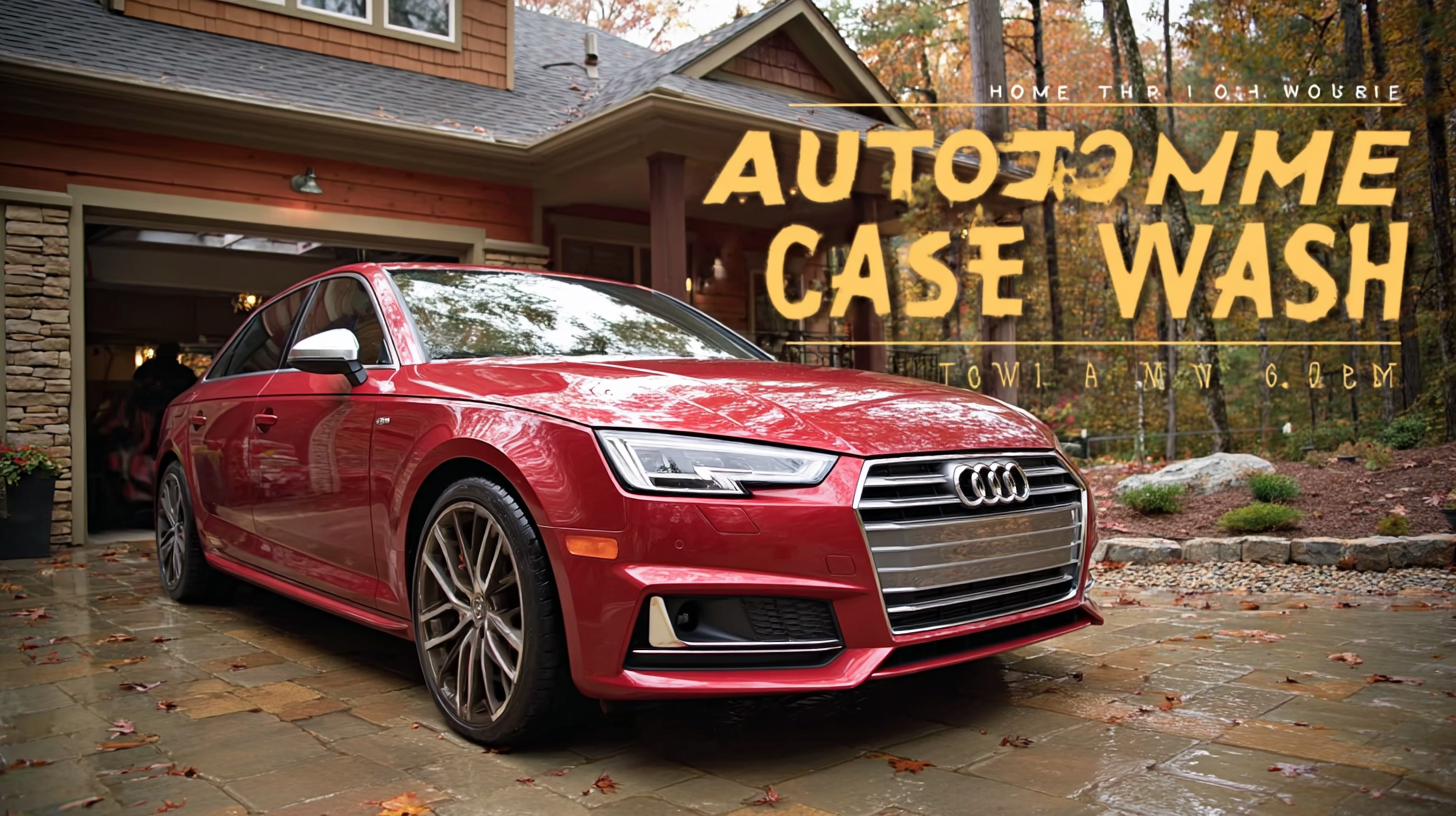Essential Guide to Choosing the Best Automatic Home Car Wash System for Your Needs
As the popularity of car wash systems continues to rise, the demand for convenient and efficient cleaning solutions has led to a significant increase in the market for Automatic Home Car Wash Systems. According to a recent report by Grand View Research, the global car wash services market was valued at approximately $33 billion in 2021 and is expected to grow at a compound annual growth rate (CAGR) of 3.5% through 2028. This growth is driven by the increasing number of vehicles on the road and the rising consciousness regarding vehicle maintenance. Homeowners are seeking automated solutions that not only save time but also provide high-quality cleaning without the need to frequent commercial car washes. This essential guide will help you navigate the myriad choices available in the market, enabling you to select the best Automatic Home Car Wash System that meets your specific needs and preferences.

Understanding the Different Types of Automatic Home Car Wash Systems Available
When it comes to maintaining the appearance of your vehicle, choosing the right automatic home car wash system is crucial. Understanding the different types available can help you make an informed decision that fits your needs and lifestyle. There are three primary types of automatic car wash systems: touchless, cloth, and hybrid. Touchless systems often use high-pressure water and specialized detergents to clean vehicles without any physical contact, reducing the risk of scratches. According to a report by IBISWorld, touchless car wash systems have seen a rise in popularity, capturing approximately 27% of the market share in recent years.
Cloth-based systems, on the other hand, utilize soft fabric materials to gently scrub the vehicle’s surface. These systems have been favored for their ability to provide a more thorough clean but may pose risks of scratching if not maintained properly. Industry data shows that cloth car wash systems represent around 45% of the market, as their efficiency and effectiveness continue to attract numerous users. Meanwhile, hybrid systems combine elements of both touchless and cloth technology, offering a versatile cleaning solution that appeals to a broader range of consumers looking for convenience without compromising quality. Understanding these distinctions not only helps you choose the best system for your vehicle but also ensures that your investment provides long-term satisfaction.
Comparison of Different Types of Automatic Home Car Wash Systems
This chart represents the different types of automatic home car wash systems based on their popularity, effectiveness, and cost. The data shows the general perception of users regarding each type.
Key Industry Standards and Certifications for Home Car Wash Equipment
When selecting an automatic home car wash system, understanding the key industry standards and certifications is crucial to ensure that you invest in quality equipment. One of the primary certifications to look for is the International Organization for Standardization (ISO), which emphasizes reliability and efficiency in machinery. An ISO-certified system typically adheres to stringent testing and performance metrics, helping eliminate concerns about product durability and effectiveness in various weather conditions.
Another important aspect to consider is the American National Standards Institute (ANSI) certification, which offers guidelines for equipment safety and operator usability. An ANSI-certified car wash system provides peace of mind, knowing that the equipment is designed with user safety as a priority. Additionally, pay attention to certifications pertaining to environmental standards, such as the EPA’s WaterSense label, which indicates that the system uses water efficiently, contributing to sustainability efforts. By focusing on these essential certifications, you can make a well-informed decision that ensures the performance and longevity of your home car wash system.

Evaluating Water and Energy Efficiency Ratings in Car Wash Systems
When it comes to choosing an automatic home car wash system, evaluating water and energy efficiency ratings is crucial for both environmental impact and cost savings. Water efficiency ratings indicate how effectively a system uses water to wash your vehicle without wasting resources. Look for models that incorporate advanced technology, such as high-pressure pumps and optimized nozzle designs, which help achieve a thorough clean while using less water. Systems with lower gallons per wash are typically more favorable, as they contribute to sustainable water use and lower utility bills.
Energy efficiency is equally important, especially in today’s eco-conscious market. Many car wash systems now come with Energy Star ratings, which signify that they meet strict energy efficiency guidelines set by the U.S. Environmental Protection Agency. A system that consumes less power while performing at high standards not only reduces your energy costs but also lessens your carbon footprint. When researching options, consider those with features like smart sensors and adjustable wash cycles that optimize energy usage based on your vehicle's needs, ensuring an eco-friendly car wash experience.
Essential Guide to Choosing the Best Automatic Home Car Wash System for Your Needs
| Car Wash System | Water Efficiency Rating (gallons/wash) | Energy Efficiency Rating (kWh/wash) | Additional Features |
|---|---|---|---|
| Model A | 12 gallons | 1.5 kWh | Touchless wash, ceramic coating option |
| Model B | 10 gallons | 1.2 kWh | Foam cannon, wax application |
| Model C | 9 gallons | 1.0 kWh | Eco-friendly cleaning agents, undercarriage wash |
| Model D | 11 gallons | 1.3 kWh | Spot-free rinse, drying feature |
| Model E | 8 gallons | 0.9 kWh | Smart control app, customizable wash types |
Comparative Analysis of Cost vs. Features in Automatic Car Wash Systems
When selecting the ideal automatic home car wash system, a critical consideration is balancing cost with features. Many consumers are drawn in by lower-priced options, only to find that essential features such as convenient setup, water efficiency, and superior cleaning capabilities are compromised. It is imperative to evaluate what features matter most—like adjustable wash settings, foam applicators, or built-in drying mechanisms—before making a decision.

While the upfront cost is significant, long-term value should also be a priority. Systems with more comprehensive features often provide better cleaning performance and durability, which can lead to savings on repairs and additional car cleaning services down the line. Be sure to consider the total cost of ownership, including operational costs, maintenance, and how quickly the system can pay for itself through its effectiveness in keeping your vehicle clean. Choosing the right system can enhance the ownership experience, ensuring you enjoy both a sparkling clean car and a system that fits within your budget.
Maintaining and Troubleshooting Your Automatic Car Wash System for Longevity
Maintaining an automatic car wash system is crucial for ensuring its longevity and optimal performance. According to industry reports, regular maintenance can extend the lifespan of these systems by up to 50%. This includes routine inspections to check for wear and tear on the brushes and nozzles, which are critical in delivering thorough and efficient washes. Neglecting these components can lead to subpar cleaning results and, ultimately, require costly repairs or early replacement.
Troubleshooting common issues is also essential for effective operation. Data from the International Carwash Association shows that approximately 25% of automatic car wash systems experience downtime due to minor, preventable malfunctions. Simple solutions, such as adjusting water pressure or cleaning out debris from the system’s filters, can often resolve these disruptions. Additionally, employing software systems that monitor operational data can assist in identifying problems before they escalate, ensuring that your car wash system runs smoothly and remains a profitable venture for years to come.